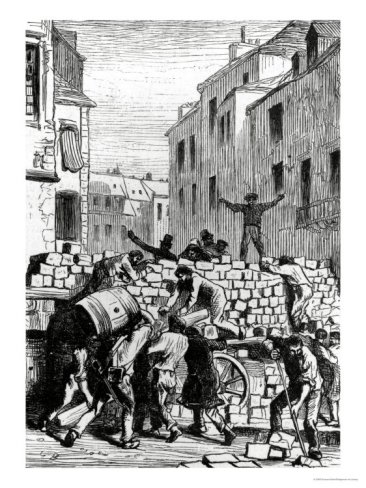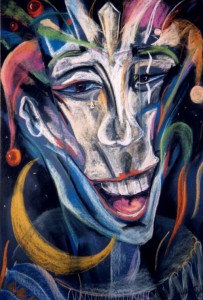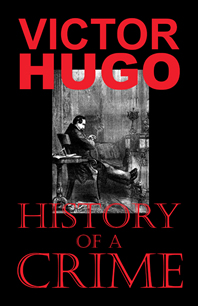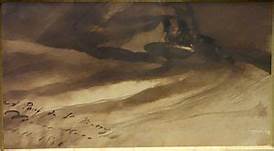Read the following overview of Hugo’s novels. Indicate the common themes in his work, express how the politics of Hugo’s era influenced his work. How is rhetoric apparent in Hugo’s novels? Use at least three of the novels as evidence in order to demonstrate your observation. Submit your notes to Turnitin.
The Hunchback of Notre-Dame uses the history of the Middle Ages and the structure of the Notre Dame cathedral to express its major themes. Notre Dame is the geographical and moral center of Hugo’s fictional Paris. The cathedral inspired Hugo to write the novel and encouraged his life long passion for Gothic art and architecture. Hugo was also a scholar of medieval Christianity and used the history of its churches, martyrs, and saints as a backdrop for the novel’s action. The French title of the novel is Notre Dame de Paris, emphasizing Notre Dame’s role as a symbol of the city. Not only does most of the novel’s action unfold inside or around the cathedral, but from the top of its towers, Claude Frollo and Quasimodo can spy on virtually anyone in the entire city. Architecturally, it is an “amalgamation” that mirrors Quasimodo’s own deformities.
At the time Hugo was writing, Notre Dame was falling apart, and there was very little respect for its architecture. Nothing had been done to repair the damage done to it during the French Revolution. However, the Romantic literary movement seized upon the cathedral as a symbol of France’s glorious Christian past. For example, in Eugène Delacroix’s famous depiction of the 1830 Revolution, Liberty Guiding the People, the two towers of Notre Dame can be seen in the background, evoking the mythic presence of Paris. Hugo greatly admired this painting, striving to represent Notre Dame as the cultural and political center of Paris. At the Romantics’ urging, Parisians gradually came to see Notre Dame as a national monument and symbol of France. By 1845, a massive restoration program of Notre Dame began.
The novel is primarily concerned with the theme of revolution and social strife. Hugo was profoundly concerned by the class differences that set the 1789 French Revolution in motion. Discord between the Clergy, Nobility, and the Third Estate (a middle class of artisans, craftsmen, and intellectuals) toppled the monarchy and established a republican government that no longer recognized the special privileges of the aristocracy and the Church. Writing during the July 1830 Revolution, Hugo was more conscious of class divisions than ever. For example, as the vagabonds prepare to march, Clopin declares: “Trade is incompatible with nobility.” Consequently, the vagabonds’ assault on Notre Dame represents an example of historical foreshadowing that would remind Hugo’s contemporary readers of the 1789 storming of the Bastille. The fact that Louis XI is in the Bastille when the vagabonds attack further emphasizes this historical reference. The fact that every character is an orphan also evokes the deterioration of the feudal system. French society was viewed as one giant happy family under the Bourbon kings and the breakdown of this family unit in the novel foreshadows the civil wars that would divide the nation in two beginning in 1789.
The theme of determinism also dominates the novel, especially in the scene where Frollo watches a fly get caught in a spider’s web. Many characters in the novel do not believe in free will. For example, when Pierre Gringoire follows La Esmerelda he “resigns his free will” and accepts any direction that she chooses. Similarly, Frollo believes that all actions have been predetermined and that nothing can stop him from catching La Esmerelda. Just as the fly is bound to get caught in the spider’s web, he thinks that she is bound to fall into one of his traps. He thus uses this example of “fatality” to justify his actions since nothing he or anyone else can do will change the predetermined outcome. As he warns his associate, one should never “meddle with fatality.” Hugo acknowledges that fate plays a powerful role in the novel, but implies that free will is possible. Hugo suggests that Frollo’s deterministic attitude and resignation of free will is what allows him to become such a horrible person. Hugo suggests that we must all exercise our free will to retain our sense of morality and the responsibility for our actions.
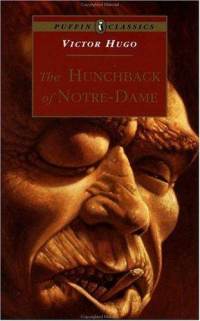
Les Miserables The convict Jean Valjean is released from a French prison after serving nineteen years for stealing a loaf of bread and for subsequent attempts to escape from prison. When Valjean arrives at the town of Digne, no one is willing to give him shelter because he is an ex-convict. Desperate, Valjean knocks on the door of M. Myriel, the kindly bishop of Digne. Myriel treats Valjean with kindness, and Valjean repays the bishop by stealing his silverware. When the police arrest Valjean, Myriel covers for him, claiming that the silverware was a gift. The authorities release Valjean and Myriel makes him promise to become an honest man. Eager to fulfill his promise, Valjean masks his identity and enters the town of Montreuil-sur-mer. Under the assumed name of Madeleine, Valjean invents an ingenious manufacturing process that brings the town prosperity. He eventually becomes the town’s mayor.
The novel contains multiple conflicts and subplots. The major conflict threaded through the book is between Valjean and Javert. Valjean has served his time and earned release from prison, but it is release with a yellow passport-meaning everywhere he goes, everyone from employers to landlords will know that he is an ex-con. This makes him suspect even when he is innocent of any wrong doing. Javert sees the law as an answer for everything, and no exception should be made regardless of how small the crime.
The situation is complicated when Valjean takes upon himself the care of Cosette, as he feels responsible for the death of her mother. With Cosette, Valjean learns to love and the bitterness of the years of injustice melt away. He thinks of himself as a convict and makes no excuses; his only reason for hiding and avoiding Javert is to protect Cosette and his fatherly relationship with her.
Additional minor conflicts occur between Marius and his Grandfather, between Marius and Valjean, and between Valjean and Thenardier. Fantine, a young woman from Montreuil, lives in Paris. She falls in love with Tholomyès, a wealthy student who gets her pregnant and then abandons her. Fantine returns to her home village with her daughter…
The Man Who Laughs (first published under the French title L’Homme qui Rit in April 1869) is a sad and sordid tale — not the sort of tale of the moment Hugo was known for. The first major character whom the reader is introduced to is a mountebank who dresses in bearskins and calls himself Ursus (Latin for “bear”). His only companion is a large domesticated wolf, whom Ursus has named Homo (Latin for “man”, in a pun over the Hobbesian saying “homo homini lupus”, meaning “man is a wolf to [his fellow] man.”). Ursus lives in a caravan, which he conveys to holiday fairs and markets throughout southern England, where he sells folk remedies.
The action moves to an English sea coast, on the night of January 29, 1690. A group of wanderers, their identities left unrevealed to the reader, are urgently loading a ship for departure. A boy, ten years old, is among their company, but they leave him behind and cast off. The desperate boy, barefoot and starving, wanders through a snowstorm and reaches a gibbet, where he finds the corpse of a hanged criminal. The dead man is wearing shoes: utterly worthless to him now, yet precious to this boy. In the meantime, the wanderers’ ship sinks after a long struggle with the sea in the English Channel. After walking some more, the boy finds a ragged woman, frozen to death. He is about to move onward when he hears a sound within the woman’s garments: He discovers an infant girl, barely alive, clutching the woman’s breast. Hugo’s narrative describes a single drop of frozen milk, resembling a pearl, suspended from the dead woman’s nipple. Although the boy’s survival seems unlikely, he now takes possession of the infant in an attempt to keep her alive. The girl’s eyes are sightless and clouded, and he understands that she is blind. In the snowstorm, he encounters an isolated caravan, the domicile of Ursus.
The action shifts forward 15 years, to England during the reign of Queen Anne. Duchess Josiana, a spoiled and jaded peeress (and illegitimate daughter of King James II), is bored by the dull routine of court. Her fiance, David Dirry-Moir, the illegitimate son of a proscribed baron and to whom she has been engaged since infancy, tells the duchess that the only cure for her boredom is “Gwynplaine”, although he does not divulge who or what this Gwynplaine might be.
Ursus is now 15 years older. The wolf Homo is still alive too, although the narration admits that his fur is greyer. Gwynplaine is the abandoned boy, now 25 years old and matured to well-figured manhood. In a flashback, during the first encounter between Ursus and Gwynplaine, the boy is clutching the nearly-dead infant, and Ursus is outraged that the boy appears to be laughing. When the boy insists that he is not laughing, Ursus takes another look, and is horrified. The boy’s face has been mutilated into a clown’s mask, his mouth carved into a perpetual grin. The boy tells Ursus that his name is Gwynplaine; this is the only name he has ever known.
The foundling girl, now sixteen years old, has been christened Dea (Latin for “goddess”). Dea is blind but beautiful and utterly virtuous. She is also in love with Gwynplaine, as she is able to witness his kindly nature without seeing his hideous face. When Dea attempts to “see” Gwynplaine by passing her sightless fingers across his face, she assumes that he must always be happy because he is perpetually smiling. They fall in love.
Ursus and his two surrogate children earn a bare living in the fairs and carnivals of southern England. Everywhere they travel, Gwynplaine keeps the lower half of his face concealed. He is now the principal wage-earner of their retinue; in each town they visit, Gwynplaine gives a stage performance; the chief feature of this performance is that the crowds are invariably provoked to laughter when Gwynplaine reveals his grotesque face.
At one point, Ursus and Gwynplaine are readying for a performance when Ursus directs Gwynplaine’s attention to a man who strides purposefully past their fairgrounds, dressed in ceremonial garments and bearing an elaborate wooden staff. Ursus explains that this man is the Wapentake, a servant of the Crown. (“Wapentake” is an Old English word meaning “weapon-touch”.) Whomever the Wapentake touches with his staff has been summoned by the monarch and must go to wherever the Wapentake leads, upon pain of death.
Josiana attends one of Gwynplaine’s performances, and is sensually aroused by the combination of his virile grace and his facial deformity. Gwynplaine, too, is aroused by Josiana’s physical beauty and haughty demeanor. Suddenly, the Wapentake arrives at the caravan and touches Gwynplaine with his staff, compelling the disfigured man to follow him to the court of Queen Anne. Gwynplaine is ushered to a dungeon in London, where a physician named Hardquannone is being tortured to death. Hardquannone recognizes the deformed Gwynplaine, and identifies him as the boy whose abduction and disfigurement Hardquannone arranged twenty-three years earlier.
In the year 1682, in the reign of James II, one of the king’s enemies was Lord Linnaeus Clancharlie, Marquis of Corleone and a baron in the House of Lords, who had remained faithful to the English republic and had emigrated to Switzerland. Upon the baron’s death, the king arranged the abduction of his two-year-old son and legitimate heir: Fermain, heir to his estates. The King sold Fermain to a band of wanderers called “the Comprachicos”. David Dirry-Moir is the illegitimate son of Lord Linnaeus, but now that Fermain is known to be alive, the heritage once promised by the King to David on the condition of his future marriage to Josiana will instead belong to Fermain.
The word “Comprachicos” is Hugo’s invention, based on the Spanish for “child-buyers”.[1] They make their living by mutilating and disfiguring children, who are then forced to beg for alms, or who are exhibited as carnival freaks. On the King’s command, the two-year-old Fermain is sold to them and disfigured.
It becomes clear that, after renaming Fermain, Gwynplaine, the Comprachicos kept him in their possession until they abandoned him eight years later in 1690, on the night when he found Dea. Their ship was lost in the storm at sea, with all hands, but, in their repentance before death, they wrote out a signed confession and cast this adrift in a sealed flask, which now has belatedly come to the attention of Queen Anne.
Dea is saddened by Gwynplaine’s protracted absence. Ursus and his band are falsely told that Gwynplaine is now dead. Dea has always been frail, but now she withers away even more. The authorities condemn them to exile for illegally using a wolf in their shows.
Gwynplaine accidentally meets Josiana, having been brought into her palace by her confidant, the intriguer Barkilphedro. At first she nearly seduces him, perversely excited by his deformity. However, she then receives a letter containing the Queen’s order to marry him (as a replacement for David and the legitimate Lord Clancharie) and therefore violently rejects him as a lover, while accepting him as her (formal) husband.
Gwynplaine is now formally instated as Lord Fermain Clancharlie, Marquis of Corleone. In a grotesque scene, he is dressed in the elaborate robes and ceremonial wig of investiture, and commanded to take his seat in the House of Lords. But, when the deformed Gwynplaine addresses his peers with a fiery speech against the gross inequality of the age, the other lords are provoked to laughter by Gwynplaine’s clownish features. After the end of the session, David defends him and challenges a dozen Lords to a duel, but then he also challenges Gwynplaine to a duel for having chastised David’s mother for having become the mistress of Charles II after having been the lover of his own father, Lord Linnaeus.
Gwynplaine renounces his peerage and returns to the caravan of Ursus, and to the only family he has ever known. At first he cannot find them and nearly commits suicide out of grief. Then he manages to find them and board their ship bound for the continent in the last minute. Dea is delighted that Gwynplaine has returned to her. She reveals her passion to Gwynplaine, and then she abruptly dies. Gwynplaine then walks, as though in a trance to the edge of the ship, speaking to Dea, and with the reflection of a distant light in his eyes, though the sky is starless. He throws himself into the water, and is thus reunited with Dea in death. When Ursus, who has fainted in Dea’s last moments, comes to his senses, Gwynplaine has vanished, and Homo is staring mournfully over the ship’s rail, howling into the sea from which Gwynplaine will not return.
The History of a Crime (French: Histoire d’un crime, 1877) is a novel by Victor Hugo about Napoleon III’s takeover of France. By the age of twenty-nine Victor Hugo was the established master of French poetry, drama and the novel; by virtue of Les Orientales, Hernani and Notre Dame de Paris respectively. He would write for nearly fifty-four more years with no significant depreciation in his work. Hugo wrote, in Dieu (God), that Satan had sent three evils into this world; war, capitol punishment and imprisonment. On April 13, 1845 Hugo was made a Peer de France and on June 4th he was elected to the National Assembly. The revolution of 1848 marked a watershed in the social and political opinions and ultimately in the course of the great writer’s literary career. However, for Victor Hugo the course that would lead him from the right to the left in the Chamber of Deputies, unfolded gradually over the first two years of the upheaval.
Hugo’s reputation as a critic already insured that his preventative arrest along with other dissenting parliamentarians. Hugo also futilely attempted to form a resistance committee and tried to rally popular support in Paris for a new round of barricades. These moments are the subject of his novel History of a Crime. By the time the great romantic had begun his exile he had turned one hundred and eighty degrees, from an adherent of the restored monarchy to a champion of a democratic and social republic. When his political activities forced him to flee Paris, he started writing less than 24 hours after he arrived in Brussels. In less than five months, he completed History of a Crime, which contains vicious attacks on Napoleon III. Belgium asked Hugo to leave because they were forced to maintain friendly relations with France. Hugo then went to the small island of Jersey not far from the French coast, but he would never make a real home
Hugo wrote History of a Crime in 1852, with the intention to expose the true nature of Louis-Napoléon’s coup d’etat on 2 December 1851. But when completed, he refrained from publishing it as no company would dare to buy it and it would probably disturb the relations between Belgium and France. It was later published in 1877.
Toilers of the Sea was published in 1866. The book is dedicated to the island of Guernsey, where Hugo spent fifteen years in exile. Completed in 1866 when Hugo was living in exile in St Peter Port‘s Hautville House (below), it was originally published in French under the title Les Travailleurs de la mer.
The inscription in the front of the book reads, “I dedicate this book to the rock of hospitality and liberty, to that portion of old Norman ground inhabited by the noble little island nation of the sea, to the island of Guernsey, severe yet kind, my present asylum, perhap’s my tomb’.
Toilers of the Sea tells the story of Gilliatt, who lives in the Bû de la Rue, a decrepit house in St Sampson. He arrived on Guernsey as a small boy, brought there by his mother, but where she came from nobody knows. She left him the house in her will, along with a chest full of women’s clothes that she said he should give to his wife when he married.
When he reaches the point where she stopped, he sees that she’s written his name in the snow, and he’s smitten. From that point forth, he watches her, and sometimes plays Bonnie Dundee his bagpipes, outside the house where she lives with her uncle, Lethierry. Lethierry is having none of it. He tells Gilliatt to stop wasting his time: Lethierry will never allow him to marry Déruchette.
Lethierry is a retired captain, who’s invested in a steam boat called the Durande. The local fishermen hate it, calling it the Devil Boat, and so do the priests, as it’s unnatural to bring water and fire together when God has set them apart. Nonetheless, under the captaincy of the trusted Clubin, it does a good trade, taking Guernsey products to the French markets quickly enough for them still to be fresh.
If it wasn’t for the fact that Lethierry had been robbed of his fortune by Rantaine, a poor French man that Lethierry had brought to Guernsey, he’d never have needed to run the Durande at all. Lethierry has come to love his boat, though, just as much as he loves his niece. It would be his dream to find a younger captain for his boat than Clubin, who could also be Déruchette’s husband, but on the whole he would be happy for her to choose her own husband – just so long as it’s not a man of the church.
At about that time, a priest arrived on the island. Ebenezer Caudray was to take over from the rector of St Sampson, who was moving to St Peter Port. Caudray would one day come into a fortune when his uncle, the dean of St Asaph, dies – if he himself should live that long, which he almost didn’t do. Exploring the island on his first day, he sat in a seat-shaped rock close to Gilliatt’s house, where people tend to fall asleep and drown as the sea rises. The priest, too, dozes off. Fortunately, Gilliatt, who has just won a sloop in a sailing competition, sees him while he’s out in his new boat, and rescues him just in time.
On his frequent trips to St Malo in the Durande, Clubin would stay at the Jean Auberge tavern, where he met captain Zuela, a man who helps fugitives escape the law. One day, Clubin sees Zuela talking to what looks like a Quaker among the St Malo rocks and, consequently, goes to a gun smith to buy a revolver.
Back on Guernsey, three boys are looking for birds’ eggs on the cliffs around Pleinmont when they come across the isolated, supposedly haunted house up there. They overhear men inside arranging for someone else – unnamed – to wait there for transport to Torbay in England courtesy of a man called Blasquoto, who’ll be coming from Bilbao.
Later that week, back in St Malo, the Quaker comes up behind a coastguard, who has been watching a ship anchored just offshore. The Quaker kills him, and a moment later, Clubin appears – with the revolver in his hand. He identifies the Quaker as Rantaine and demands that he repays the money he stole from Lethierry, with interest. Rantaine hands over a tin box with £3000 inside it. Clubin lets him go, but Rantaine says he’ll make sure Lethierry’s informed the debt’s been repaid.
Clubin set sail in the Durande the next morning, despite being warned by the locals not to do so. All the other boats are returning to port, but Clubin presses on, telling the drunk helmsman (who is only drunk from consuming a whole bottle of brandy that Clubin had hidden where he knew the helmsman would find it), to ignore the oncoming tempest. The boat runs around in this fog on what Clubin believes is the Hanois rocks, a mile from Pleinmont. The passengers and crew evacuate, but Clubin says they’re to leave him there, alone, or else the lifeboat will capsize. This had all been part of his plan, though. He wanted to steal the £3000, so had deliberately grounded the Durande, and planned to swim from Hanois back to Guernsey. They leave him, but as the fog clears, Clubin sees that he’s not on Hanois, but the Douvres, a series of isolated rocks too far from shore to swim. Nonetheless, he must try. He dives into the sea, where something grabs his ankle and pulls him down. He never comes back up.
When news of the grounding gets back to Guernsey, everyone thinks Clubin acted like a hero. The captain of a passing ship had seen no sign of him, but did describe the Durande as being wedged between the rocks and says that the engine may be salvageable. Déruchette says she will marry any man who can recover it, and Lethierry says that he would allow such a marriage to proceed.
That night, Gilliatt heads for the Douvres in his sloop. When he gets there, he strips anything useful from the Durande and organises it into piles in a cave. He makes another cave into a forge by starting a fire and directing the airflow over a large rock to feed the flames. He then goes out in search of food, and discovers a beautiful, other-worldly grotto in which the water is lit by a phosphorescence. He spots something ribbon-like in the deepest parts, but it retreats into the darkness before Gilliatt leaves.
He manages to free the engine and lower it into his sloop, but it takes two months, and another storm is on the way. He uses old planks from the Durande to create a breakwater, and when the storm passed he has one last scouting mission for food. He follows a crab back into the grotto and puts his hand into a crevice to try and catch it. As he does, a giant octopus snares him, wrapping five of its tentacles around him arm and body, and starting to suck his blood. He has just one chance to kill it, which he does, by slashing its head with his knife. While he’s washing his wounds in the water inside the cave, he spots Clubin’s remains. The tin box containing the £3000 is still strapped to his belt.
Gilliatt takes the money and sails back to Guernsey. He returns the engine and the money to Lethierry who says that he must now marry Déruchette. However, Gilliatt overhears the rector, Ebenezer Caudray, proposing to Déruchette, and Déruchette accepting, so he refuses. Lethierry insists, and hearing this, the rector makes plans to leave Guernsey alone. Before he does, though, Gilliatt sees them in Havelet Bay and convinces him and Déruchette to marry and go together to England. They do so, and Gilliatt gives her the clothes that his mother said he should give to his wife, explaining to her that he’s unlikely to ever marry.
He goes to the seat-shaped rock by his home where he’d saved the rector’s life, and sits there to watch Déruchette and the rector sail off to England, ignoring the rising water. By the time their boat disappears over the horizon, the water has risen over Gilliatt’s head. “Nothing was visible now but the sea”.

